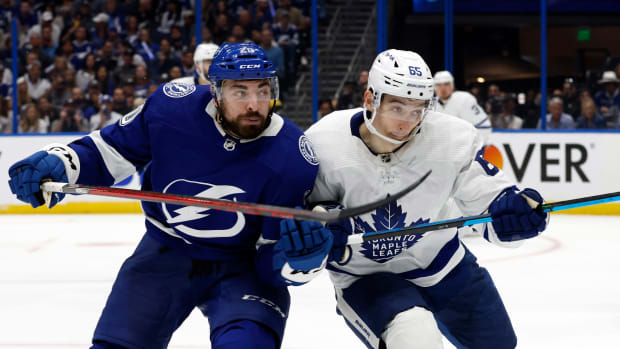Here we go again.
The Tampa Bay Lightning are looking to continue another run that has made them the most dominant team in the NHL over the past three seasons.
The Toronto Maple Leafs are looking to win a Stanley Cup playoff round for the first time in 18 years.
Two teams with very different pathways to this point. The Leafs last won a playoff round in 2004, the same year Tampa Bay won its first of three Stanley Cups. Since then, the Atlanta Thrashers became the Winnipeg Jets, about half the league has changed arenas, Facebook, YouTube and Twitter were launched and Seattle and Vegas entered the league, too.
So, to say one team might want it more is a bit of an understatement. But those dang Bolts. They’re defending champions for a reason.
A 4-3 overtime win for Tampa Bay forced Game 7, and now the series shifts back to Scotiabank Arena for what should be a wild finale. Toronto is now 0-9 in series-clinching games since 2018, but this series feels different. The numbers seem to lie in Toronto’s favor in some cases, but getting it done against a team that hasn’t lost back-to-back post-season games since 2019 has been a challenge.
Let’s set the scene for tonight’s big Game 7:
1. Stay Out of the Dang Penalty Box
The Tampa Bay Lightning had just one power-play goal in Game 6, but it was the one that tied things up at three apiece. It definitely could have been worse for the Leafs, Toronto has averaged a playoff-leading 6.83 penalties per game, while Tampa Bay sits at 6.00. Toronto’s power-play percentage is a measly 16.0, with a 77.4 percent penalty kill, while Tampa Bay bests them with a 22.6 and 84.0, respectively.Â
Neither team has been burned too badly from the penalties themselves, but forcing yourself to switch things up on a consistent basis because you’re missing a man on the ice doesn’t do you much good, either.
2. Which Goaltender Will Balk First?
Goaltending was a huge part of Game 6, and while neither had a heavy workload, they kept things tight in overtime.Â
But over the entire series, goaltending has been a question mark for both teams. Among goalies with at least three games played, Jack Campbell has a .920 save percentage (10th out of 16 goalies at 5-on-5) and minus-0.15 goals saved above average (10th). Vasilevskiy falls even deeper with a .906 save percentage at 5-on-5 (14th) and a minus-1.91 GSAA (15th).
Campbell was a true Vezina Contender in the first half of the season and Vasilevskiy is a finalist for the prestigious award. Unfortunately for both sides, they’ve had some rough outings along the way, and one is going to need to step up in a big way in Game 7. History suggests that Vasilevskiy will be the one to stand tall, but Campbell is playing for a new contract and, potentially, a new home. Expect one heck of a battle in the crease.
3. Which Stars Will Shine Above the Rest?
Toronto’s big four – Auston Matthews, John Tavares, Mitch Marner and William Nylander – have come alive over the past two games, combining for 12 points over the past two games. Tampa Bay’s big four – Nikita Kucherov, Brayden Point, Steven Stamkos and Ondrej Palat – have combined for nine points.Â
Toronto has an edge in the short term, but both teams have had their ups and downs. It’s Game 7, and history definitely gives Tampa Bay an edge in the big-game performance department.
Of course, we don’t base games on past performance, and it only matters what you’re capable of doing now. Both teams need their big players rested and ready to go for the biggest games of their respective seasons, and the winner will be the one that gets the most out of its highest-paid stars.
But, scoring depth needs to be a thing, too. Seven players have two goals or more for Tampa Bay, with 12 players scoring at least once. Eight Maple Leafs have at least two goals, with 11 scoring at least one. Depth is a strong suit for both teams, and could be the difference in Game 7.



